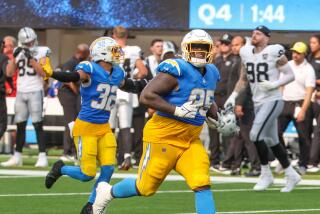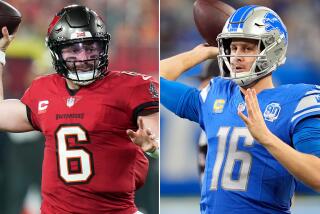Let the Coaches Feel Some Pain
- Share via
Judging by the cries that are coming from the NFL players who are paying fines this year for lawlessly attacking quarterbacks, the league’s disciplinary authorities are moving in the right direction.
Late hits and helmet-to-helmet hits and other such examples of unnecessarily violent football are unjust and intolerable and should be punished, and that’s happening.
The only question is whether the punishment has been severe enough to keep the league’s most successful quarterbacks alive and well and functioning into December and the winter playoffs. Those guilty of breaking NFL laws--most of them defensive linemen--are continuing to scream about the unfairness of their fines, but, at the same time, they’re continuing to assault quarterbacks.
It seems obvious at this point that these people and the coaches who condone their conduct can only be restrained by fines that are measurably heavier.
Coach Supportive
The player who broke the jaw of Indianapolis quarterback Peyton Manning the other day--a Miami defensive end named Lorenzo Bromell--plans to appeal his fine ($15,500) not because the fine was oversized but primarily because he wants the world to believe that he was “just doing his job.”
Predictably, his coach, Dave Wannstedt backed him up--following the lead of Denver’s Mike Shanahan and all the other NFL coaches who keep defending their lawbreakers--who all say the same thing: “They fined me for doing my job.” This nearly universal reaction means that the league can only protect its quarterbacks by, in every case, acting against both the coach as well as the deviant player.
If small fines aren’t doing it, the league’s only recourse is heavier fines. A late hit on a passer, for example, should cost the pass rusher a game’s salary and the coach a like amount--doubled for every late hit by any member of the same team.
That, you can be sure, would stop the assailants in their tracks
At the same time, it would put some pressure to be right on Commissioner Paul Tagliabue and his chief disciplinarian, Gene Washington. But all they need remember is that illegal hits knocked the AFC’s best quarterbacks out of the most recent Super Bowl and guaranteed that that game would be an offensive travesty of a kind that won’t indefinitely attract the football public.
Passing Perilous
Fans of American football deserve to see the league’s best quarterbacks in the playoffs. As NFL crowds all know, they pay enough for it. In every stadium every week, they have to sit through long stretches of no football whatsoever because the game has been stopped for another avalanche of TV commercials.
For those watching at home, it’s worse. They have to listen to the commercials.
Their patience suggests that they’ll continue to tune in only if the quality of the game remains high. Thus, the least the league can do is take every legitimate step to assure the NFL public that the quarterbacks who lead the teams into the playoffs are still there to contend in the playoffs.
Commissioner Tagliabue had that in mind when, last summer, he publicly reminded his referees that in a game as fast-moving as pro football, a late hit has to be flagged regardless of whether it’s a late, late, late hit or a possible late hit. It says so in the NFL’s by-laws.
And the referees are cooperating. For they have the best of all views of passers and pass rushers. They can see that it’s perilous to play quarterback today.
The lawful, normal hazards are awesome. The illegal stuff--on top of the normal dangers--is too much. It takes too big a toll on quarterbacks. So what’s needed now is simply sterner league action: a more appropriate, and more realistic, load of fines.
Late-Hit Prizes?
The defensive people who feel picked on for picking on NFL quarterbacks all make the same complaints. At Baltimore, defensive tackle Tony Siragusa said it for himself and the others when he said the league cares when quarterbacks are hit in the head but not when defensive players are cut down by chop blocks.
There are two rejoinders to that. First, the league does care enough to subsequently fine the guilty. Second, here are some of the distinctions between quarterbacks and defensive linemen:
* A passer is dreadfully vulnerable in the instant after he releases a pass. There’s no real way for him to protect himself. Arms separated, he is concentrating on the pass. By comparison, defensive linemen are normally in position to care for themselves.
* When quarterbacks are lawlessly assaulted, there’s no way for them to fight back. On a pass play, they’re busy looking for receivers. After any play, to be successful, they must contemplate not retaliation but the next play. By comparison, defensive linemen, when unfairly attacked, have many ways to retaliate.
* Defensive players are plain wrong when, after sneaking in a late hit, they whine that they were just doing their job. The truth is that if the ball is gone, the passer did his job, but the pass rushers didn’t. When defensive players aren’t penalized or fined for illegal hits, they are, in fact, being rewarded for failing--and that, lads, is not American justice.
Bears Throw It
The Chicago Bears made an interesting discovery after losing to Green Bay two weeks ago on a day they should have won. Tapes of the Packer game revealed to them what every spectator saw, namely, that the Bears tried to win with a bunch of one-yard passes.
Since NFL rules and by-laws allow passes of any length, that was obviously not the wisest course.
So last Sunday, the Bears made amends. They authorized quarterback Jim Miller to throw some long ones too, and, getting stronger every minute, he aimed three down the field to wide receiver Marty Booker on pass plays that measured, in order, 28, 44, and 66 yards--all for touchdowns.
The first, which hit Booker in the hands at the goal line, was the key, informing two people that Miller can throw hard and deep with precise accuracy.
One stunned spectator was Tampa Bay Coach Tony Dungy, whose defense, the NFL’s best designed, is specifically constructed to prevent that exact pass.
The other was Chicago Coach Dick Jauron, who reacted strangely, allowing Miller to throw so often thereafter that he outstatisticked Jauron’s favorite offensive player, running back Anthony Thomas, 25 passes to 23 runs. The day’s totals: 228 yards for Miller, 58 for Thomas.
That did in Tampa Bay, 27-24, as the 7-2 Bears reached the top of the NFC Central with an offensive coordinator who is learning in every game. He’s John Shoop, whose pre-Bear coaching experience totaled seven years: one year at Dartmouth, three as a graduate assistant at Vanderbilt, and four with the Carolina Panthers.
Broncos Wounded
Denver’s Broncos are demonstrating again this season that waves of injuries can repeatedly cut down an otherwise able Super Bowl contender--year after year. Since winning the Super Bowl twice consecutively in the late ‘90s, Denver Coach Mike Shanahan has been consistently jinxed by injuries.
The 2001 wave started rolling over him on opening day when 6-foot-5 wide receiver Ed McCaffrey went down with a broken leg. As quarterback Brian Griese’s go-to catcher, McCaffrey was Denver’s Most Valuable Player.
Other injuries have taken out running back Terrell Davis and others. And when a last-straw injury claimed wide receiver Rod Smith, Griese had no one to throw to at Washington Sunday, losing, 17-10
Of the NFL’s many sad injury stories this year, perhaps the saddest is the case of Terrell Davis. The league’s greatest running back when injury-free, Davis appeared to have regained his peak form the week before the Washington game as the Broncos outscored San Diego, 26-16.
That day, Davis was for awhile the Davis of the two Super Bowl wins, the wonderful running back who never misses a hole. As always, confronting the Charger defense, he knew just where to put the shoulder pads, where to cut. Always heading down the field, always making tacklers miss, he was always getting lower than the tackler, always driving up.
Then the lights went out again. Only in football can that much talent be sacrificed on the altar of injury.
Martz Amazing
The Rams won at New England last Sunday night, 24-17, despite five new crippling injuries, including ankle problems that cost them their fastest wide receiver, Az-Zahir Hakim, in the first quarter. They survived because the wound that matters most to this club, quarterback Kurt Warner’s thumb injury, didn’t seem to bother him in this game. In the science of running out the clock, the Rams have become the best since the 49ers of the Bill Walsh era. This time, protecting a seven-point lead in the fourth quarter, Warner ran off 14 plays on one final long Ram drive until Coach Mike Martz put him in knee formation for the last couple on the goal line.
In another nationally televised appearance, Martz showed the country the same fast-moving pass offense that has lifted the Rams to the top of football
Still bucking the trend that has made the NFL a running-play league--at least in 25 or more of the 31 franchise cities--Warner won by as usual passing on most downs.
Strategically, it takes two things for any team to do that: the intelligence to create an inventive offense and the courage to call it
Martz, who created it, also calls it.
The 25 other pro clubs that keep plunging into the line, how much intelligence does that take?
Defensively, despite the loss of four starters, Martz again showed off his other platoon, which swarms to the ball with more speed and quickness and more players than any NFL competitor.
One test of Martz last spring, after the club’s defensive off-year, was whether he could bench eight or nine starters and put an entire new defense together. If he could do it at all, it would take three years, rivals predicted. It took him one year.
For one thing, Martz knew he wanted to put in the Tampa Bay defense, which has bothered the Rams in other seasons with a continually slanting, hard-charging line, backed by a sound deep zone defense. It’s hard to run against Dungy and hard to pass on him deep, which doesn’t leave many openings.
To teach it to the Rams, Martz brought in a Dungy assistant, Lovie Smith, who seems to be running the Dungy defense with more flair this year than the founder can.
As for New England the other night, the Rams were beating a much-improved team. The Patriots have taken hold under their new quarterback, Tom Brady, to become a contender in one of the most competitive NFL divisions of recent years.
More to Read
Go beyond the scoreboard
Get the latest on L.A.'s teams in the daily Sports Report newsletter.
You may occasionally receive promotional content from the Los Angeles Times.










